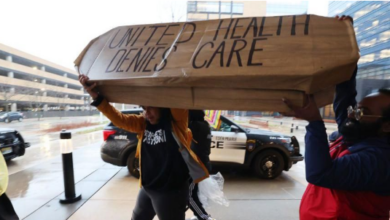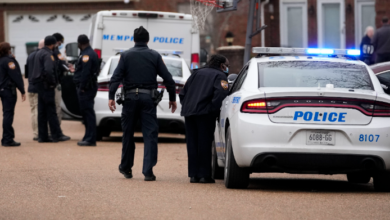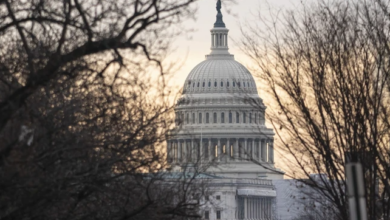Michigan Voices On The Fight For Reproductive Freedom


Source: JEFF KOWALSKY / Getty
News One spoke with the voting rights activist about what’s at stake for voters in Michigan this election cycle and why it’s important to center community and diversity when organizing ahead of the midterms.
Could you tell us about the advocacy work you do with Michigan Voices?
Michigan Voices is a nonpartisan 501(c)(3) social justice organization where we focus on civic and community engagement in the entire state of Michigan. We are a backbone organization, meaning that we don’t specifically run one program.
We support over 100 organizations running programs in their communities to reach out to BIPOC and disenfranchised people. We make sure that people are aware and educated on their rights to vote and are involved in the community and make sure that they know what policies would help improve their quality of life.
I am the co-director of the organization along with Sommer Foster.
With midterms just weeks away, what do you think is at stake for voters in Michigan this election cycle?
I am one of those people who get tired of everybody saying, this is the most important election of our lifetime. What we have learned is every election is a vital election for the survival of our communities. And we saw this so much with the pandemic.
There were communities that were not listened to, there were hundreds of thousands of people who perished, students having COVID, and no resources were flowing into those communities. Because the politicians who were elected were not marginally elected by those communities. So, they were not listening to them, they were not looking out for them.
We know that in order for us to survive and for future generations to thrive, we need to be voting for people who understand what our issues are and who are fighting and creating policy for our best interest. We also need representatives who are also dismantling policies of white supremacy that have been embedded in our country that harm us, even when we don’t even know it’s around harming us.
Michigan has made news at various different points during the post-2020 period, but something that has really caught people’s attention is the issue of abortion in Michigan. Voters in Michigan organized and got a ballot initiative to fight back against this. Can you tell us about the work that is being done around engaging people in this ballot initiative?
Michigan Voices was one of three organizations that started convening a lot of different groups around reproductive justice and reproductive freedom. We knew that when Roe v. Wade was overturned, there was going to be an all-hands-on-deck type of movement. One of the things that I am so proud of in Michigan is that we are talking about reproductive freedom. We are talking about access to abortion, but we also know that Black and brown women, even when Roe v. Wade was the law of the land, were still dying at a higher rate than white women after giving birth.
There are Black and brown and white women and indigenous women in prison that have to be handcuffed to a bed while giving birth as if they were going to escape somehow. And so we put these things in this ballot initiative so that we can be as inclusive as possible, to make sure that everybody felt like this was something for them.
I’m a Black woman. In the Black community, abortion, especially in the church community and in the older community, is something that is frowned upon. And so if we’re just focusing on abortion, we lose that whole demographic.
But there are people like myself who have had to have a medical abortion because of health reasons or because the child was not viable in the womb. These are all the reasons that we are fighting to protect women’s and women adjacent individuals to reproductive freedom while fighting for abortion access as a part of that overall reproductive freedom.
How are Black voters responding to this broadening of the conversation around not simply abortion but reproductive freedom?
I’ve been in convenings with Black people who feel like they are finally being heard when we talk about reproductive freedom. I live in Michigan, I was born and raised, and both of my parents are from Mississippi. My great-grandmother was born a slave. My grandmother was born a sharecropper.
My grandmother used to talk about not having the right over her own body. And Black women in this country have not had bodily autonomy since we came over on slave ships. So this ballot initiative is a way to claim your body. I think more people are just excited about this because it is talking about more than just abortion access. It’s talking about resources.
It’s talking about doctors listening to Black women when they go to the doctors and say they don’t feel good or something isn’t right. And we talk about Serena Williams. We’ve talked about Beyonce. As influential as they are, they still had a hard time getting their doctors to listen to them. It is fighting for the lives of women, no matter what color they are, but Black women are finally feeling like they’re being heard.
How is the conversation helping with your organization’s outreach and engagement with voters this election cycle?
We are listening to everybody. We have groups who are a part of our reproductive justice ballot initiative, who are Muslim and cannot represent an organization, but they come as individuals because this is something important to them. It brings everybody together.
But it talks about helping and supporting. And it doesn’t matter what you look like, it doesn’t matter where you live, it is saying we have to do this together. And I think this is the foundation of how we need to start organizing in general. If we focus on one specific issue, we’re going to exclude so many people.
We need to make it as broad as we can. We need to make sure that we’re lifting up the voices of as many people as possible so that they can feel like this is a part of who they are. So that they can continue to fight and work in organizing and educating people around it.
One of the things that we heard a lot, especially from older Black women, is when these white women get into a bind, they talk about all women should organize. But when Black women or brown women are being attacked for their race, then white women don’t show up.
We’ve seen how white women have taken advantage of Black women in organizing movements before, going back to the suffrage movement. This initiative holds people accountable. This has just brought so many people together and lifted up so many voices that I think, once again, this is how we organize a community and not focus on one issue that affects one group of people. But we talked about what does it look like for a better future for everybody? And then let’s organize it that way.
Is there anything else you would like to share about this campaign or the community work you are doing?
Michigan Voices is run by two amazing black women. We have a very diverse staff, part of the LGBTQ community. We have Muslim women, we have white women, we have Black women. It is important that when we are organizing, when we are talking to people that people see representation. People don’t want to be talked to or talked at or taught like they’re being saved by somebody.
We know that people of color are resilient and will make something out of nothing to the point other people will try to co-opt they sh*t. Right, we know that all of these things are true. And if we organize in that way, if we allow people to use their culture, and not whitewash things to make it more, you know, mainstream.
I lift up in 2020, in Atlanta, strippers were out there organizing to get people registered to vote. But it’s a cultural thing. We have to be able not to say organizing looks this type of way or saving democracy looks this type of way. It looks the way that each individual community is. It’s not a monolith.
You don’t organize Black people in all the communities the same way. You don’t organize Muslims all the same way. And I think Michigan Voices has finally figured that out, and it’s working to help our communities organize and keep the pressure on. We know that the attack on democracy never sleeps. So the fighting to keep it alive shouldn’t either.
SEE ALSO:
Op-Ed: It’s Time to Listen to Black Women When It Comes to Reproductive Rights. Here’s Why.
It’s Not Just Congress. Downballot Elections Need Your Attention This Cycle.
Source link





